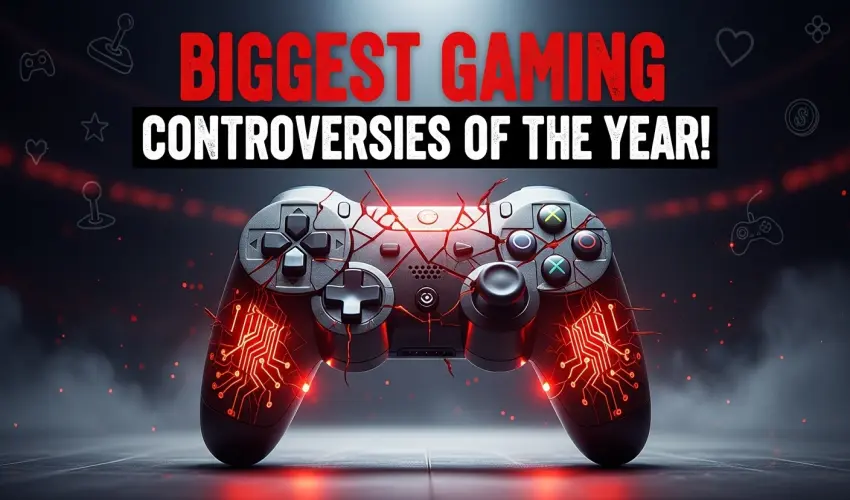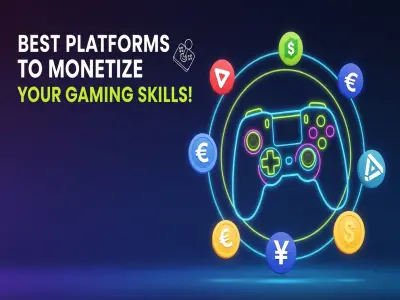Biggest Gaming Controversies of the Year!
Published Mar 20, 2025
1 0
Key Takeaways
-
AI Backlash: The use of AI-generated assets stirred massive community backlash, with many players accusing developers of "lazy dev" practices.
-
Aggressive Monetization: Microtransactions returned with a vengeance, as $70 full-price games pushed aggressive in-game monetization models, frustrating players.
-
Esports Integrity: The integrity of esports was questioned following high-profile cheating allegations and tournament bribery scandals.
-
Broken Launches: Developers faced widespread criticism for broken launches, rushed deadlines, and misleading marketing across several highly-anticipated releases.
-
Ethical Dilemmas: The industry faced ethical dilemmas over mass layoffs, union busting, and studio closures amid record-breaking profits.
-
Culture Wars: Gaming communities became battlegrounds over political, social, and identity-related issues within game narratives and character designs.
Introduction: Controversy Hits Every Corner of Gaming in 2025
In 2025, the gaming industry has been on fire—but not always in a good way. While technology has soared to new heights, so have the challenges. From monetization nightmares to labor rights disputes, it’s been a year full of drama, debates, and deep divides within the gaming world. Players, developers, and publishers have all been at the center of the storm.
In this deep dive, we break down the biggest gaming controversies of the year, what caused them, and how they’ve shaken up the community.
1. AI in Game Development: Innovation or Laziness?
Perhaps no controversy in 2025 generated as much heated debate as the rise of AI-generated assets in major game releases. Some studios boasted about using generative AI for backgrounds, character dialogue, and even voice acting, promising efficiency and cost reduction. But many players saw it differently.
One infamous case involved a popular open-world RPG that was exposed for using AI-generated quest dialogue, resulting in robotic conversations and a loss of emotional depth. Players accused the studio of “lazy dev” practices, and voice actors protested the use of AI clones trained on their past performances without consent.
On the flip side, indie developers defended AI as a tool for leveling the playing field. The argument: while AAA studios misused AI for shortcuts, small creators used it to bring their visions to life. Regardless of perspective, AI’s place in gaming has ignited a culture war that’s still far from over.
2. Microtransactions in $70 Games: The Final Straw?
Monetization controversies are nothing new, but in 2025, they reached a new boiling point. Several high-profile releases launched at the full $70 price tag yet still included predatory microtransactions, gacha-style loot boxes, and pay-to-win upgrades.
A futuristic racing game became the poster child for this outrage. While praised for its graphics and mechanics, it locked faster cars behind randomized crates, requiring either an extreme grind or real money. Players quickly dubbed it “Race to Pay.”
Gaming influencers and watchdog groups rallied against the trend, launching the #FairPriceGaming movement on social media. Some publishers responded with minor tweaks, but the damage to consumer trust was done.
3. Broken Launches and Refund Rage
Nothing disappoints players more than a hyped game launching in a broken state. This year saw multiple titles debut with game-breaking bugs, missing features, or unplayable performance, leading to massive refund requests and review bombs.
One of the year’s most anticipated space exploration titles suffered a disastrous PC launch, with frame rates dropping below 20 FPS on high-end rigs. The developers issued a public apology, but many fans demanded refunds. This revived the ghost of past disasters like Cyberpunk 2077 and No Man’s Sky, reminding gamers once again: never pre-order without skepticism.
4. Layoffs, Crunch, and Corporate Greed
Despite record profits for the gaming industry, layoffs were rampant in 2025. Major studios cut hundreds of jobs just months after reporting billion-dollar revenue quarters.
Several exposés by journalists revealed stories of toxic crunch culture, where developers worked 80+ hour weeks only to be laid off before the game even launched. In response, unionization efforts gained traction, with strikes erupting across multiple studios. The controversy drew massive support from players, many of whom began boycotting games linked to exploitative labor practices.
5. Political Themes and Character Backlash
Several games released this year boldly tackled political themes, from climate change to gender identity. While praised by many for pushing narrative boundaries, some segments of the community reacted with backlash, accusing studios of “virtue signaling.”
One post-apocalyptic RPG featuring a transgender main character sparked both praise and fury, igniting review-bomb campaigns and online harassment. In another instance, a military shooter that included a level set during a controversial real-world conflict faced accusations of historical revisionism. The debate over politics in gaming continues to divide communities with no sign of slowing down.
6. Esports Cheating Scandals and Bribery Allegations
2025 hasn’t been kind to the world of competitive gaming. Major esports tournaments were rocked by cheating scandals, match-fixing, and bribery allegations, calling the integrity of the entire scene into question.
A high-profile Valorant player was banned for using a wallhack during a LAN qualifier. In another incident, a pro League of Legends team was accused of throwing a match for betting profits. These scandals have led to renewed calls for stricter esports regulation and centralized oversight.
7. Content Creator Drama: When Streamers Go Too Far
It wouldn’t be a modern gaming year without content creator chaos. In 2025, several major streamers found themselves embroiled in controversy, some due to toxic behavior and others for questionable sponsorships or manipulated giveaways.
One viral incident involved a top-tier FPS streamer who used racial slurs on stream, leading to bans and the loss of brand deals. Elsewhere, another prominent creator was exposed for faking a charity stream. These events serve as a reminder that with great audience power comes great responsibility.
8. The NFT Resurgence in Mobile and Indie Games
Just when we thought NFTs were gone for good, they crept back, this time baked into indie and mobile games disguised as “digital collectibles.” Several games launched without announcing NFT integration, only for players to discover blockchain backends after playing, sparking fury over the lack of transparency.
9. Censorship, Region Locks, and Cultural Backlash
A few international releases ran into censorship issues, with games being altered or banned in certain countries due to content deemed politically sensitive or morally offensive. This has led to a wider debate about whether cultural sensitivity is crossing the line into artistic restriction, with many players turning to VPNs to access uncensored versions.
10. The Future of the Industry: A Call for Reform
What these controversies show is that the gaming industry is at a crossroads. The excitement around new technology is often marred by exploitation, poor decisions, and ethical conflicts.
But there’s also hope. Gamers have never been more informed, vocal, or empowered. Communities are holding companies accountable, developers are forming unions, and players are organizing boycotts. If 2025 has been turbulent, it has also been transformational.
Conclusion: The Year Controversy Became a Catalyst
While 2025 brought some of the best games of the decade, it also exposed some of the industry's ugliest truths. From broken launches and financial exploitation to political firestorms and labor crises, this was a year where the joy of gaming clashed hard with the realities behind the scenes.
But controversy isn’t always bad. Sometimes, it’s the spark needed to create change. If the conversations sparked this year lead to more transparency, fairer pay, and better storytelling, then perhaps 2025 will be remembered not just for the games, but for the stand gamers took.








